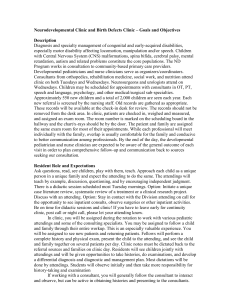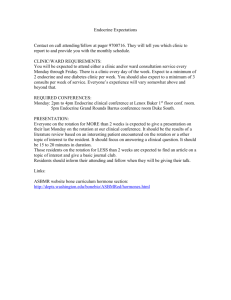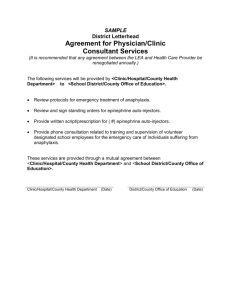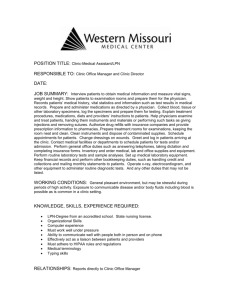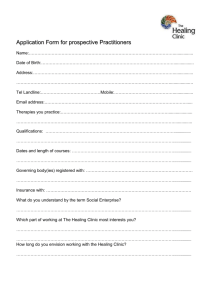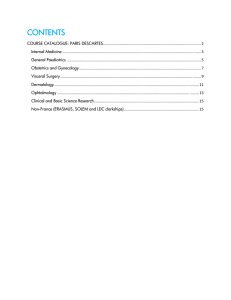Responsibilities of the Resident Physician in the Outpatient Clinic
advertisement
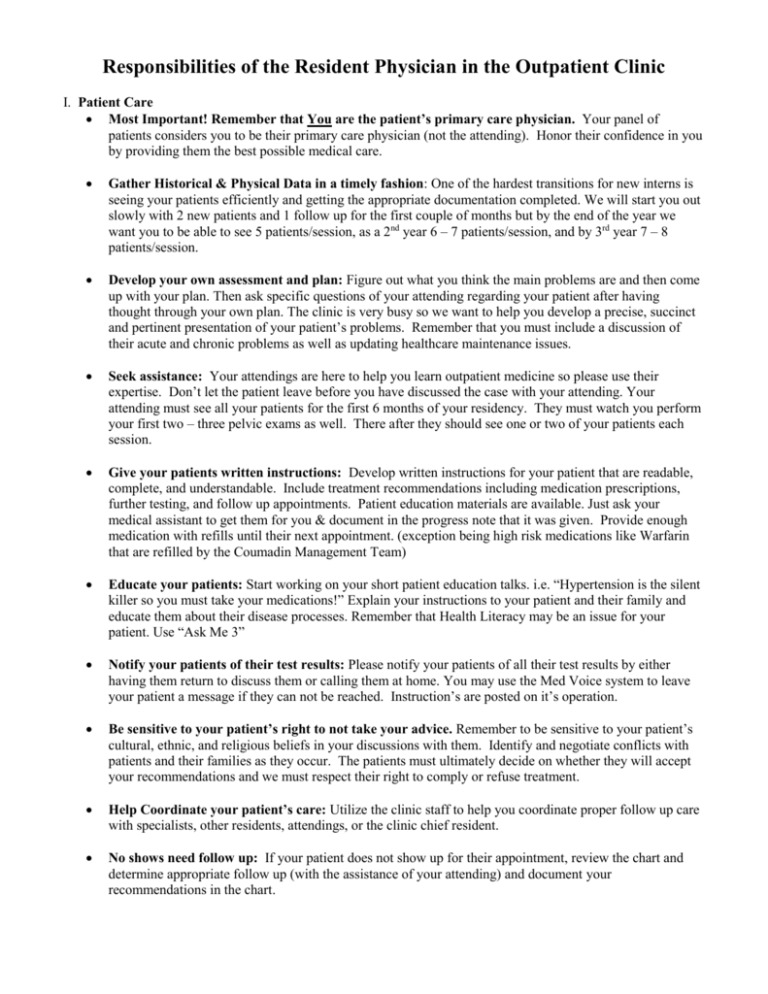
Responsibilities of the Resident Physician in the Outpatient Clinic I. Patient Care Most Important! Remember that You are the patient’s primary care physician. Your panel of patients considers you to be their primary care physician (not the attending). Honor their confidence in you by providing them the best possible medical care. Gather Historical & Physical Data in a timely fashion: One of the hardest transitions for new interns is seeing your patients efficiently and getting the appropriate documentation completed. We will start you out slowly with 2 new patients and 1 follow up for the first couple of months but by the end of the year we want you to be able to see 5 patients/session, as a 2nd year 6 – 7 patients/session, and by 3rd year 7 – 8 patients/session. Develop your own assessment and plan: Figure out what you think the main problems are and then come up with your plan. Then ask specific questions of your attending regarding your patient after having thought through your own plan. The clinic is very busy so we want to help you develop a precise, succinct and pertinent presentation of your patient’s problems. Remember that you must include a discussion of their acute and chronic problems as well as updating healthcare maintenance issues. Seek assistance: Your attendings are here to help you learn outpatient medicine so please use their expertise. Don’t let the patient leave before you have discussed the case with your attending. Your attending must see all your patients for the first 6 months of your residency. They must watch you perform your first two – three pelvic exams as well. There after they should see one or two of your patients each session. Give your patients written instructions: Develop written instructions for your patient that are readable, complete, and understandable. Include treatment recommendations including medication prescriptions, further testing, and follow up appointments. Patient education materials are available. Just ask your medical assistant to get them for you & document in the progress note that it was given. Provide enough medication with refills until their next appointment. (exception being high risk medications like Warfarin that are refilled by the Coumadin Management Team) Educate your patients: Start working on your short patient education talks. i.e. “Hypertension is the silent killer so you must take your medications!” Explain your instructions to your patient and their family and educate them about their disease processes. Remember that Health Literacy may be an issue for your patient. Use “Ask Me 3” Notify your patients of their test results: Please notify your patients of all their test results by either having them return to discuss them or calling them at home. You may use the Med Voice system to leave your patient a message if they can not be reached. Instruction’s are posted on it’s operation. Be sensitive to your patient’s right to not take your advice. Remember to be sensitive to your patient’s cultural, ethnic, and religious beliefs in your discussions with them. Identify and negotiate conflicts with patients and their families as they occur. The patients must ultimately decide on whether they will accept your recommendations and we must respect their right to comply or refuse treatment. Help Coordinate your patient’s care: Utilize the clinic staff to help you coordinate proper follow up care with specialists, other residents, attendings, or the clinic chief resident. No shows need follow up: If your patient does not show up for their appointment, review the chart and determine appropriate follow up (with the assistance of your attending) and document your recommendations in the chart. Follow up on your patients in the hospital: If your patient requires hospitalization, coordinate a smooth transition with the inpatient residents and see your patient whenever possible while they are in the hospital. II. Documentation Learn to do a great SOAP note: Accurate and up to date charting is as important as the care given because medical legally, if you don’t document what you do then you didn’t do it. Please include at the bottom of your note the name of the attending that saw or discussed the patient with you. Example: “patient seen and discussed with Dr. .“ Follow up Needs Documentation too! Documentation involves follow-up of lab results, consults, X-rays, and all other chart checks. It also includes all patient phone calls. You must write a short note in the chart about everything you do. Your precepting attending must review & co-sign all chart checks and follow up lab/Xray/Consultation notes. Charts can be your friend or your enemy: If you update the patient’s problem list including family & social history; preventive flow sheet; diabetes flowsheet (if indicated); and medication list it will make your next encounter with the patient III. Paperwork Completing paperwork/forms can be time consuming but it is an important part of your patient’s care. Although you may plan to hire someone to do this for you in the future, you will always be responsible for the information that is on the forms you sign. The goal at the clinic is to teach you about the insurance regulations and requirements so that you will be able to understand how things work. Billing: You will be asked to fill out encounter forms correctly including ICD-9 & CPT codes; Radiology requests with appropriate clinical information; and DME (durable medical equipment) requests; Home Health orders; Insurance prior authorization forms; & Chronic O2 requests. All must be co-signed by your attending. Your Patient’s forms/letters: Your patients may also request your assistance in completing a wide variety of forms including loan deferments; low cost housing & telephone forms; disability license plate forms; and disability income paperwork. Please review them with your attending before completing. Our social worker, Joy, is an excellent resource if you have questions. IV. Professional Behavior Be courteous to your peers, clinic staff, and attendings. Your willingness to help out each other will make your time in clinic more enjoyable. Dress appropriately – closed-toed shoes. Wear something your 80 year old patient would think their doctor would wear. Your clinic evaluation will include assessments by the clinic staff. Be on time. If you are running late (it happens) please call 239-4016 & let us know. Deal with problems constructively. If you have ideas for improvement – share them with the appropriate person (the Medical Director of your practice site) Learn clinic policies and comply with them. Practice self-evaluation with attention to remedying areas of weakness. Have initiative. Don’t wait for someone to ask…pitch in. Ask for help. That’s why we are here. Voice frustrations in an appropriate time and place. Not in front of staff & patients.

